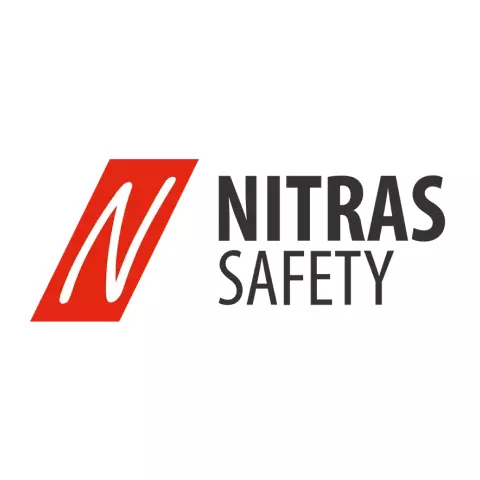NITRAS SOLID STEP S3S CI FO Safety Shoes, Black/Blue
Nitras
visit storeProduct description
Professional safety footwear combining advanced protection features with ergonomic comfort and durability. These shoes feature a fibreglass toe cap, perforation-resistant textile midsole, and premium COMFORT STEP insock for optimal support. The dual-density PU/PU outsole provides superior slip resistance while maintaining ESD capabilities for sensitive work environments.
Product Features:
- Metal-free construction with fibreglass toe cap
- Textile perforation resistant midsole
- Premium COMFORT STEP ergonomic insock
- Easy donning and doffing with reinforced heel lining
- Highest slip resistance (SR) rating
Technical Details:
- Dual-density PU/PU outsole construction
- Width 11 for comfortable fit
- Robust microfibre heel reinforcement
- Additional protective toe cap
- ESD-capable design
Standards:
- S3S CI FO certification
- DGUV Rule 112-191 certified
- EN IEC 61340-4-3 compliant for ESD protection
The method used to secure the shoe to your foot, affecting ease of putting on/removing, adjustability for comfort, and workplace safety.
Indicates whether the footwear has protective reinforcement (Safety) or no special toe protection (Plain), affecting workplace safety compliance and injury prevention.
Withstands degradation from oil exposure, maintaining sole integrity and extending shoe life. Ensures reliable traction in oily environments.
Reduces impact on feet and joints, lessening fatigue during long hours on hard surfaces. Provides enhanced comfort for demanding work environments.
Enhances stability on slick surfaces, reducing the risk of slips and falls. Designed for reliable grip and secure footing in various work environments.
Identifies the protective material in the toe cap that shields against impacts and compression. Different materials offer varying levels of protection, weight, and comfort.
The material composition of the shoe's bottom portion that determines slip resistance, durability, and protection against workplace hazards like chemicals, heat, or punctures.
- Electrical Protection
- Slip Resistant
- Impact Resistance
Request a free sample
Test first and buy later. Visit any product page to request your free sample.
Standards and labels
EN 61340-5-3:2018 is a European standard that defines the requirements and test methods for measuring the performance of ESD (electrostatic discharge) protection for electronic devices. This standard covers the performance of equipment and materials that are intended to protect electronic devices against electrostatic discharges, which are a type of electrical shock caused by the build-up of static electricity. The standard also includes test methods to evaluate the equipment's and materials' performance, including tests for electric strength, charge decay, and resistance to penetration of electrostatic charges. Test results must show that the equipment and materials meet or exceed the required performance levels and other requirements specified in the standard.
Test results
Electrostatic Discharge AntistaticTest results
General Requirements CIThe CI designation in the standard EN ISO 20345:2011 refers to the insulation performance of footwear against cold. This specification indicates that the footwear offers insulation against cold conditions, protecting the wearer's feet from low-temperature environments. The test method for determining this involves measuring the temperature decrease inside the footwear when exposed to cold conditions over a specified period. This performance is crucial for footwear used in conditions where exposure to cold is significant, ensuring safety and comfort for the wearer in such environments. The practical implications for safety footwear in this category include enhanced worker safety and performance in cold climates, applicable to industries such as construction, cold storage, and outdoor operations in winter conditions.
General Requirements FOThe standard EN ISO 20345:2011, specifically its General Requirement FO, pertains to footwear containing fuel oil-resistant outsoles. When footwear under this specification successfully meets the FO requirement, it implies that the footwear's outsole has been tested and confirmed to resist degradation due to contact with fuel oil. The test involves exposing the outsole material to fuel oil for a determined period, typically 22 hours, at a controlled temperature of 22°C. This test assesses the change in volume and properties of the outsole following fuel oil exposure by measuring its tensile strength and elongation before and after the exposure. For procurement professionals, a positive FO result indicates that the footwear's outsole will maintain its mechanical performance and integrity when in contact with fuel oil, making it suitable for industries where oil exposure is frequent, providing durability and reliable performance under such conditions.
General Requirements S3The EN ISO 20345:2011 standard specifies the general safety requirements for protective footwear used in various industries. The S3 designation under this standard means the footwear has met certain criteria, including basic toe protection, anti-static properties, energy absorption of the seat region, water resistance, fully enclosed heel, cleated outsole, and penetration resistance by a steel midsole. This classification involves specific test methods like compression and impact tests on toe protection, antistatic resistance tests, energy absorption verification at the heel section, water penetration, and absorption tests to ascertain the upper material's resistance, and penetration resistance tests to ensure the protective features of the outsole and midsole. For industries requiring protective footwear that can withstand mechanical risks, moisture, and sharp objects, achieving an S3 result guarantees a high safety level, making footwear that meets this requirement suitable for environments with increased moisture and at risk of foot penetration by sharp objects.
General Requirements CRThe standard EN ISO 20345:2011 encompasses general requirements for safety footwear to ensure they provide adequate protection in various occupational environments. Rating 'CR' signifies that the footwear has a cut resistant upper ensuring enhanced protection. The test method involves assessing the material's resistance to splitting or cracking under certain conditions, which simulates real-world industrial hazards involving sharp objects or surfaces. Practically, this result ensures that the footwear is suitable for environments where there is a risk of materials splitting or getting caught, thereby providing essential safety benefits to the user.
Textiles are materials made from fibers, such as cotton, wool, or polyester. In Europe, there are rules for how textiles should be made, sold, and labeled. These rules are set by the European Union. These rules ensure that textiles are safe and do not contain harmful chemicals, that they are labeled correctly and that the use of certain dangerous chemicals are banned. These rules are set to protect the health and safety of consumers and the environment. Companies that make or sell textiles in the EU must comply with these rules.
Nitras delivery terms
Free delivery when you order more than 1 650,00 kr from Nitras
Supplier shipping fee 60,00 kr
Brand minimum 0,00 kr
586,55 kr
Shipping fee is 60,00 kr for orders under 1 650,00 kr
Sold in units of one pair
Need larger quantities?
Other products you may like
Recently viewed
Need help?
Get help from our experts
Other products you may like
Similar products you may like
Recommended for you
Nitras
Delivery time: 3 business days
Supplier shipping fee 60,00 €
Free shipping on orders over 1 650,00 €



Find +150,000 products from hundreds of brands
Autonomous sourcing platform
The most efficient way to source and order supplies for your operations
Sourcing
Ordering
List products you’re looking for and we’ll find the best products and prices for you – all for free.
Need help?
Get help from our experts




